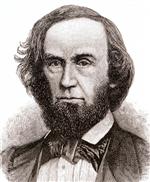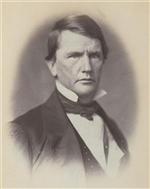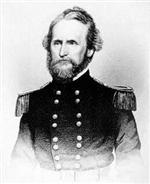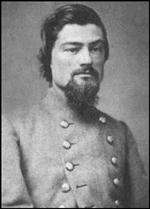The Protagonists in the Battle of Carthage
In the first half of 1861, there was a earnest struggle going on in the State of Missouri. On one side was Claiborne Fox Jackson, elected in November 1860 to be the Governor of Missouri. On the other side was United States Congressman Francis Preston Blair, Jr., representing Missouri's 1st Congressional District, whose brother, Montgomery, was President Abraham Lincoln's Postmaster General. Both these men would emerge as the leaders of their respective factions. Both were uncompromising in their beliefs.

Claib Jackson was a Democrat and firm in his belief that the Federal Government should not use coercion against any State that wanted to secede. As the newly elected Governor, Jackson made the following statements in his inaugural address on January 3rd: [3]
Is there nothing alarming in the fact that the whole power of the Federal Executive is pledged in advance for the subversion of the constitutional rights of nearly one-half of the Republic?

Frank Blair was an Unconditional Unionist and believed it was illegal for any State to secede and that the Federal Government could use any means to prevent a State from seceding. Frank Blair had expressed these views in an 1858 speech on the floor of the House of Representatives concerning the unrest in the Utah Territory, in which he made the following comments: [4]
I know of no difficulty—none at all—on the subject of the power of the President to move the Army into the Territories of this Government . . . It is the right of the people of the country to govern what belongs to them; and I say it is rank cowardice to abdicate a power conferred on Congress by the Constitution.

Although these two men were the leaders, one man would serve as the catalyst in the Struggle for Missouri. A Captain in the United States Army, Nathaniel Lyon had been assigned to the Kansas Territory in the 1850s. Based on his experiences there, he would write to a friend that “the aggressions of the pro-slavery men will not be checked, till a lesson has been taught them in letters of fire and blood.” Knowing something about Lyon's feelings towards secessionists and slavery, Frank Blair had been instrumental in having Lyon reassigned to the Saint Louis Arsenal. The two of them would meet soon after Lyon arrived in St. Louis. Blair soon started lobbying to have Captain Nathaniel Lyon put in command at the Arsenal. On March 13th, just nine days after Lincoln's inauguration, the new Secretary of War, Simon Cameron, put Captain Nathaniel Lyon in command of the US troops at the St. Louis Arsenal. Following the fall of Fort Sumter, US Army Captain Nathaniel Lyon would write the following: [5]
I have felt deeply mortified by the humiliating attitude of my country toward traitors who could easily have been put down, and can be now, under proper measures. I do not see how a war is to be avoided . . . Yet I have no apprehensions about the final triumph of almighty truth, though at the cost of many unnecessary sacrifices. But let them come. I would rather see the country lighted up with the flames of war from the center to its remotest border, than that the great rights and hopes of the human race expire before the arrogance of secessionists.

Basil W. Duke, a secessionist leader in Missouri who would rise to the rank of Brigadier-General in the CSA Army, would describe later that: [6]
Lyon was, in his own way, a man of as much capacity as Blair, fully as energetic, and as quick to decide and execute, with a will as strong but even more relentless; and absolutely fanatical and indifferent concerning the means he employed to accomplish what he deemed a proper end.
